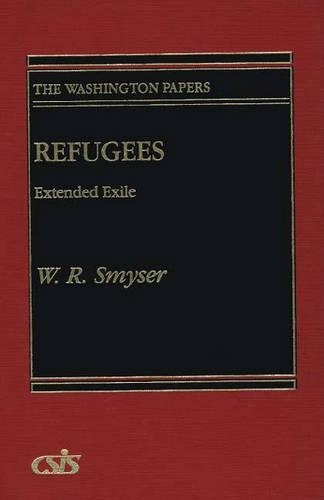
Refugees: Extended Exile
(Hardback)
Publishing Details
Refugees: Extended Exile
By (Author) W. R. Smyser
Bloomsbury Publishing PLC
Praeger Publishers Inc
9th September 1987
United States
Classifications
Tertiary Education
Non Fiction
Civics and citizenship
Refugees and political asylum
362.87
Physical Properties
Hardback
158
Description
One of this century's greatest tragedies, and one of our greatest challenges, has been the movement of millions of refugees. . . . This book, by an expert in the field, gives a comprehensive view of where we have been, and where we are likely to go, in coping with this world's endless stream of refugees. Senator Edward M. Kennedy, Chairman, Subcommittee on Immigration and Refugee Affairs This survey of post-World War II refugees by a former UN Deputy High Commissioner for Refugees focuses on those assisted through the United Nations and its affiliated Refugees (UNHCR), the International Committee for Migration, and the World Food Program. . . . Smyser argues that refugee problems and crises are far from over and will continue to require urgent international cooperative treatment. He presents a lengthy agenda with recommendations `to preserve the global structure of refugee protection and care, to help those who need help, to prevent abuse, and to bring refugee concepts and practices into a framework appropriate to our troubled times. Choice
Reviews
One of this century's greatest tragedies, and one of our greatest challenges, has been the movement of millions of refugees.... This book, by an expert in the field, gives a comprehensive view of where we have been, and where we are likely to go, in coping with this world's endless stream of refugees.-Senator Edward M. Kennedy, Chairman, Subcommittee on Immigration and Refugee Affairs, Committee on the Judiciary
This survey of post-World War II refugees by a former UN Deputy High Commissioner for Refugees focuses on those assisted through the United Nations and its affiliated agencies such as the United Nations High Commission for Refugees (UNHCR), the International Committee for Migration, and the World Food Program. Refugees from Africa, Indochina, Afghanistan, and Central and Latin America have been included. The Palestinians, who are under jurisdiction of a special agency, the United Nations Relief and Works Agency for Palestinian Refugees in the Near East (UNRWA), are excluded from the study. The Jet People, ' intercontinental refugees from Asia and Africa who have flown, mostly to Western Europe to seek asylum, constitute a new phenomenon. During the 1980s hundreds of thousands hit Western Europe like a shock, ' and now the doors for asylum seekers from the Third World are clanging shut all over' the continent. Smyser argues that refugee problems and crises are far from over and will continue to require urgent international cooperative treatment. He presents a lengthy agenda with recommendations to preserve the global structure of refugee protection and care, to help those who need help, to prevent abuse, and to bring refugee concepts and practices into a framework appropriate to our troubled times.-Choice
"One of this century's greatest tragedies, and one of our greatest challenges, has been the movement of millions of refugees.... This book, by an expert in the field, gives a comprehensive view of where we have been, and where we are likely to go, in coping with this world's endless stream of refugees."-Senator Edward M. Kennedy, Chairman, Subcommittee on Immigration and Refugee Affairs, Committee on the Judiciary
"This survey of post-World War II refugees by a former UN Deputy High Commissioner for Refugees focuses on those assisted through the United Nations and its affiliated agencies such as the United Nations High Commission for Refugees (UNHCR), the International Committee for Migration, and the World Food Program. Refugees from Africa, Indochina, Afghanistan, and Central and Latin America have been included. The Palestinians, who are under jurisdiction of a special agency, the United Nations Relief and Works Agency for Palestinian Refugees in the Near East (UNRWA), are excluded from the study. The Jet People, ' intercontinental refugees from Asia and Africa who have flown, mostly to Western Europe to seek asylum, constitute a new phenomenon. During the 1980s hundreds of thousands hit Western Europe like a shock, ' and now the doors for asylum seekers from the Third World are clanging shut all over' the continent. Smyser argues that refugee problems and crises are far from over and will continue to require urgent international cooperative treatment. He presents a lengthy agenda with recommendations to preserve the global structure of refugee protection and care, to help those who need help, to prevent abuse, and to bring refugee concepts and practices into a framework appropriate to our troubled times."-Choice
Author Bio
W.R. SMYSER was United Nations Deputy High Commissioner for Refugees from 1981 to 1986. Before then, he served as Assistant Director and Director of the U.S. State Department Bureau for Refugee Programs.
